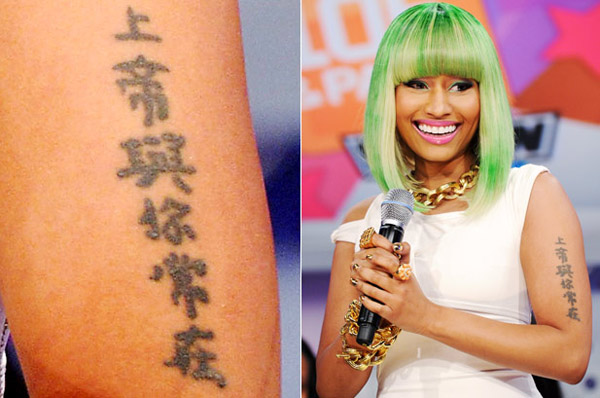Many Westerners travelling in China are struck by the bizarre English phrases bannered across the t-shirts commonly worn by young Chinese people. The slogans sometimes seem ripped from the pages of English-language fashion magazines. Some appear to be direct translations of Chinese phrases; others are truly inexplicable—monstrous freaks of grammar and syntax.
 However, perhaps we should think twice before laughing. For many years in the United States it has been popular to get tattoos depicting Chinese characters—or what we think are Chinese characters. This trend has even spread to the show-business elite; Chinese character tattoos now sprawl across some of the most high-profile skin there is. But what do these tattoos actually say? Take for instance the Chinese characters tattooed down Nicki Minaj’s left arm.
However, perhaps we should think twice before laughing. For many years in the United States it has been popular to get tattoos depicting Chinese characters—or what we think are Chinese characters. This trend has even spread to the show-business elite; Chinese character tattoos now sprawl across some of the most high-profile skin there is. But what do these tattoos actually say? Take for instance the Chinese characters tattooed down Nicki Minaj’s left arm.
 Nicki Minaj's tattoo
Nicki Minaj's tattooThis is reportedly Nicki’s only tattoo. The tattoo is six Chinese characters read sequentially from top to bottom:
上帝與你常在
Shàngdì yǔ nǐ cháng zài
This phrase appears to be a Christian-style blessing—‘God be with you’ or ‘God be with us.’ Let’s examine her tattoo more closely to get a better idea of what Nicki’s tattoo really means and how it means it. The first two characters in Nicki’s tattoo group together to form one of the Chinese phrases for the Christian God. ‘Shangdi’ was first applied to the Christian God by sixteenth century Jesuit missionaries working in China, although the phrase was originally used as an epithet for the highest deity of nature in ancient Chinese texts like the Book of Documents and the Classic of Poetry. After its initial adoption, ‘Shangdi’ was later condemned by Pope Clement XI in 1704 as part of the so-called Chinese rites controversy, although the term was eventually rehabilitated by European protestant missionaries, and today enjoys broad currency within the Chinese Christian community. The characters shàng and dì are both written correctly, although their proportions might appear a little wonky compared to the standard version, as seen here: 上帝. How do you think this standard version compare with the characters in Nicki’s tattoo? The third character in Nicki Minaj’s tattoo, yǔ, is an article meaning ‘with’ or ‘and.’ It looks like this character is written incorrectly. It is missing a vertical stroke compared with the proper yǔ character, as seen here: 與. Can you see the difference? The fourth character, the second person singular pronoun, nǐ, can be translated as ‘you.’ In this context, nǐ probably means ‘you’ in the sense of ‘everyone’ or ‘us all.’ This character appears to be miswritten as well. The radical on the left hand side should be a ‘single person’ radical, but in Nicki’s tattoo, that radical looks more like a ‘hand’ radical. The right hand side ‘ěr’ character is also crudely rendered, although legible and more-or-less passable, if not exactly correct, as compared with the standard character 你. How do you think the character in Nicki’s tattoo compares? The fifth and sixth characters form the phrase ‘cháng zài.’ ‘cháng ’ means ‘often’ or ‘always’ and ‘zài’ means present, so one might translate the phrase as ‘abide with you’ or simply ‘with you,’ as in the sense of ‘Peace be with you,’ or ‘God be with you.’ However, this phrase as rendered in Nicki’s tattoo is not idiomatically correct. Although we can guess this phrase’s meaning, the more idiomatically correct phrasing would be 同在 tóng zài, because tóng zài is the phrase most often used in Chinese-language Christian blessings. In comparison, cháng zài scans as slightly inauthentic or even strange. The characters ‘cháng’ and ‘zài’ are written fairly clearly, although the ‘dot’ of the fourth stroke in cháng is disconnected from the fifth stroke when it should connect, and the zài character just looks a bit sloppy and carelessly etched. The correct writing would be 常在. Do you think these characters look the same as those in Nicki’s tattoo? While at first glance Nicki Minaj’s tattoo may appear stylish and exotic, its aesthetic and grammatical problems become glaring upon closer inspection. Maybe she should have finished all of Integrated Chinese before getting a Chinese tattoo! But the question is—do these problems really matter? The important thing is that Nicki likes her tattoo. If she likes it, then neither pristine calligraphy nor perfectly idiomatic phrasing is important. While it is interesting to be aware of what Chinese tattoos mean and how they mean it, as with all tattoos it is ultimately more important that the person wearing the tattoo do so comfortably and confidently.


Comments